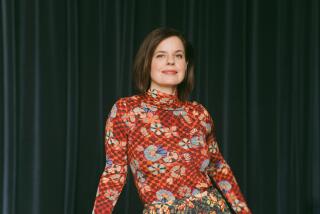Netflix documentary ‘Hot Girls Wanted’ takes demure, compassionate approach to the porn industry
- Share via
“Hot Girls Wanted,” Jill Bauer and Ronna Gradus’ 2015 documentary about pornography in the age of the Internet, has become a Netflix documentary series, “Hot Girls Wanted: Turned On.” As before, the actress Rashida Jones is a producer, though she now joins Bauer and Gradus among the directors of its six episodes, which begin streaming Friday.
The “Turned On” in the subtitle seems to be a reference to television — because you turn it on, see — and an attempt to distinguish it from the film that it deepens and extends. For a series about sex, “Turned On” is studiously non-erotic and even demure; there is more explicit nudity in most premium cable shows. The producers take care not to exploit their subjects or to judge them — at least not harshly — to take them for who they are, to hear them out even where they are foolish or fumbling.
Generally speaking, that is a recipe for making good documentaries, and also for living.
Compared to the film, “Turned On” is more subtly constructed and more handsomely produced; it has the photographic sophistication of other Netflix documentary series like “Chef’s Table” and “Abstract,” and most every episode packs the weight and complexity of a good feature film, with the addition of characters few writers could imagine. I just watched five of them at a clip (the sixth was not available for review) and though they hit similar themes, there is enough variety among them and surprise within them that the series as a whole feels not repetitive but enlarged.
Taken broadly, the series makes the point that technology has changed the way we experience sex — and, most important, and perhaps surprising in this context, love — in personal relationships and as anonymous consumers. You’ll learn that the Internet has had much the same effects on the porn business as other businesses: As the availability of free alternatives undercuts the old, “quality” models, producers are forced to provide more and more sensational products, faster and for less money.
At the same time, new avenues provide new opportunities, not merely for revenue, but for reform — this is essentially a feminist, though not a polemical, reading of these worlds.
The first episode, titled “Women on Top,” contrasts the work of female, female-friendly pornographers Holly Randall (the daughter of erotic photographer Suze Randall, also seen here) and Erika Lust, representing respectively the death of the old ways and the birth of the new. “Money Shot” revisits Riley Reynolds, the professionally thriving “model” agent seen in the “Hot Girls Wanted” film, but goes deeper into his own life. “Owning It” also addresses ideas about success from the different perspective of Bailey Rayne, an actress, entrepreneur and talent recruiter who tries to school new girls in career control and long-term business planning.
Moving on beyond production into the personal, “Love Me Tinder” follows a 40-year-old Las Vegas dating-app addict and two of the women who come within his orbit. And “Take Me Private,” about a Hollywood cam girl, her longtime Australian client, their eventual meeting and how money changes everything.
Taken most broadly, “Hot Girls Wanted: Turned On” reminds us that human variety extends beyond our own range of experience. It’s about how we understand and misunderstand ourselves and one another. It deals with issues like class and race in ways you will not have seen before. And if it’s true that Bauer, Gradus and Jones might have found and screened worse stories about any of the worlds they picture here, their series is better off for prizing compassion above sensation.
‘Hot Girls Wanted: Turned On’
Where: Netflix
When: Anytime, starting Friday
Follow Robert Lloyd on Twitter @LATimesTVLloyd
More to Read
The complete guide to home viewing
Get Screen Gab for everything about the TV shows and streaming movies everyone’s talking about.
You may occasionally receive promotional content from the Los Angeles Times.







